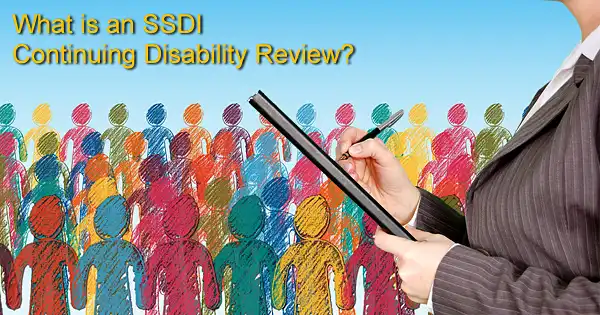What is an SSDI Continuing Disability Review or CDR?
If you are receiving SS disability benefits you will be the subject of a Continuing Disability Review. You need to understand what it is and how to prepare for it.
Author Attorney Lloyd Bemis:
Updated: 9/16/2022
A Continuing Disability Review or CDR is a routine review conducted by the Social Security Administration to make sure that people receiving Social Security Disability (SSD) and Supplemental Security Income (SSI) benefits are still qualified as disabled and entitled to receive those benefits.

A CDR is a routine review conducted by the SSA to ensure that people receiving SSDI and SSI benefits are still qualified as disabled and entitled to receive those benefits. Call 512-454-4000 for help today.
What is a Continuing Disability Review (CDR)?
If you are receiving Social Security disability benefits, the Social Security Administration will periodically review your case to determine if your medical condition has improved and if you are still disabled.
These routine reviews, called Continuing Disability Reviews or CDRs, are required by law and conducted at least once every three years. Because Social Security does not assume that you will be permanently disabled when you are initially granted Social Security Disability or Supplemental Security Income, CDRs are conducted by the Social Security Administration to make sure that people receiving Social Security Disability (SSD) and Supplemental Security Income (SSI) benefits are still qualified as disabled and entitled to receive those benefits. If you have a condition that is not expected to improve, Social Security will review your case every five to seven years.
A continuing disability review may also be triggered by any of the following situations:
- You return to work.
- You inform the SSA that your condition has improved.
- Your medical evidence indicates that your condition has improved.
- A third-party informs the SSA that you are not following your treatment protocol.
- A new treatment for your disabling condition has recently been introduced.
During the CDR, Social Security will also review your income, resources, and living arrangements to make sure that you still meet the non-medical requirements of the program.
If Social Security finds you are no longer disabled or blind, your benefits will end, and if you have returned to work or your condition has improved enough that you can return to work, the SSA may end your benefits.
If you have been denied disability don’t give up! Most are initially denied. Just call 512-454-4000 for a free, no obligation consultation to learn your options and have your questions patiently answered.
When your case is up for review, Social Security will notify you by mail and send you one of two forms: SSA-454, the Continuing Disability Report, or SSA-455, the Disability Update Report.
Whether you receive SSA-454 or SSA-455 depends on whether Social Security believes your medical condition is likely to improve. Social Security will consider your impairment, age, recent earnings, how long you’ve been receiving benefits and the dates of any previous CDRs.
SSA-455 is a short form which can be completed online and asks questions such as:
- Are you working or have you worked?
- Have you discussed returning to work with your doctor?
- How is your health?
- Have you been hospitalized or had surgery?
If you receive Form SSA-455, Social Security is most likely not expecting to perform a full medical review, but may be looking for changes in your circumstances.
Red flags on the form which might alert Social Security include:
- earning more than $1,350 per month if non-blind or $2,260 if blind;
- stating that your health is better than it was at your last review;
- stating your doctor told you that you could return to work; or
- not visiting a doctor since your last review.
You should complete and return Form SSA-455 within 30 days of receiving the mailed Disability Update Report.
Social Security will use the information on the form to decide if a full medical review is necessary and will call you if the agency needs more information. If you have questions about the form, you can call Social Security at 1-800-772-1213 or 1-800-325-0778 if hearing impaired. You may also ask your personal representative or a trusted friend or relative for help. It’s important that you respond; if Social Security doesn’t hear from you, your benefits may stop.
If Social Security sends you SSA-454, the agency anticipates that your medical condition has improved and is going to conduct a full medical review of your case.
This form is similar to the initial disability application and contains questions which ask if you have seen a doctor, been hospitalized in the past year, or had any tests such as blood tests or x-rays. It also asks if you have been working and if you can perform daily activities such as driving, walking, shopping, dressing, bathing and getting along with people. Social Security will request medical records from the doctors and medical facilities listed on the form. The agency will be reviewing the period 12 months prior to the date of the notice to the present; however, Social Security may also review evidence from any time after you were granted benefits. Social Security will compare your medical records and answers to the information in your case file showing your limitations when you were originally approved for benefits. If your medical records and answers indicate improvements in your ability to work, you could be denied benefits.
How do you prepare for a CDR review?
The best thing you can do is fill out the forms Social Security sends completely and return them promptly.
Additionally, there are other steps you can take:
- If you need more time to respond, contact the SSA and request an extension.
- Request help if you need assistance in gathering information.
- Submit any updated medical information to the SSA.
- Keep copies of all documents you submit to the SSA.
- Continue to see your doctor regularly. Maintain good relationships with your medical providers and keep them informed about your condition and limitations. Let them know that the SSA will review your case and may contact them.
- Keep a list of all medical tests and treatments and know where to obtain copies of records.
- Inform the SSA of any change in address.
How long does a CDR take?
How long a Continuing Disability Review takes depends on what form you received.
Most people who receive SSA-455 receive a letter from Social Security one to three months later saying no medical review is required at this time. Social Security will then reset their medical reexamination diary at the same interval it was before receiving the notice. For example, if you were reviewed three years ago, your next review would be set to three years later.
If you received SSA-454, Social Security will perform a full medical review which may take three to five months.
Two to three percent of disability recipients who initially receive SSA-455 are selected for a full CDR. These recipients will be sent SSA-454 to fill out and a full medical review will be performed. People in this category wait five to six months or longer to find out if they will keep their benefits.

If you haven’t returned to work, the SSA will determine if there has been any improvement in your medical condition.
If not, the review process is complete and your benefits will continue. If there has been improvement in your medical condition, the SSA will decide if the improvement affects your ability or inability to work. If it does not, your benefits will continue. If the SSA determines that your medical condition has improved to the extent that you are able to return to work, you will be notified that your benefit payments will be terminated and given an opportunity to appeal the decision. If the SSA determines there is insufficient evidence to reach a decision, or the agency finds discrepancies or inconsistencies between medical evidence and information you report, you may be sent for a consultative examination which is an exam performed by a doctor that is paid for by the SSA. Drug or alcohol abuse, or unexcused failure to follow prescribed medical treatment, can also result in denials, especially when they contribute significantly to the person’s disability.
You should not be concerned about a continuing disability review unless your medical condition has improved enough for you to work.
To terminate benefits, Social Security must prove that your impairment has become less severe and any improvement must relate to your ability to work; i.e., you must have more residual functional capacity (RFC) than you had when your benefits were approved. So, if your RFC hasn’t changed, for example, if you still can’t stand or sit for more than six hours, your benefits can’t be terminated. Only a small percentage of claimants who have gone through a full medical review lose their disability benefits, though the number of these cases has increased. This may be due to a backlog of CDRs over the past three years.
If the SSA concludes you are no longer disabled and terminates your benefits, you may appeal the CDR decision by submitting a Request for Reconsideration.
If you want your benefits to continue during the time your case is appealed, the Request for Reconsideration must be submitted within 10 days of receiving the denial. If you elect to receive benefits, but your appeal is unsuccessful, Social Security will assess an overpayment and you will be required to pay back those benefits. The appeal process is lengthy, but it is worthwhile if you have a legitimate case.
Continuing disability reviews are a normal part of the life of anyone who receives Social Security Disability Income.
Your benefits will continue as long as you still have a disability that prevents you from working, but do not forget that you are responsible for reporting improvements in your condition to Social Security, or if you return to work.
At The Texas Disability law firm Bemis Roach & Reed, our attorneys are committed to helping injured or disabled clients receive the benefits they deserve. Mr. Roach is AV Preeminent and SuperLawyers rated and has become a recognized leader in the field of Long Term Disability law. Mr Bemis focuses his practice on Social Security disability while Mr Reed handles both LTD and SSDI claims. Both are AV Preeminent and SuperLawyers rated and all our attorneys have been successfully helping people fight for their rights against big insurance companies and the government since 1993. If you have applied for benefits and been denied call 512-454-4000 for a free consultation and get help NOW.


![]()
Your Free Initial Consultation
Call now:
At Bemis, Roach and Reed, if we can't help you, we will try to find the right attorneys for you.
We offer each of our prospective clients a free no obligation one hour phone or office consultation to see if we can help you and if you are comfortable with us. We know how difficult a time like this can be and how hard the decisions are. If we can be of assistance to you and help you find a solution to your issue we will even if that means referring you to another attorney.
Let's get you Started:
If you could provide us with some basic information about your claim we will get right back with you with a free case evaluation and schedule your Free Consultation Today.





